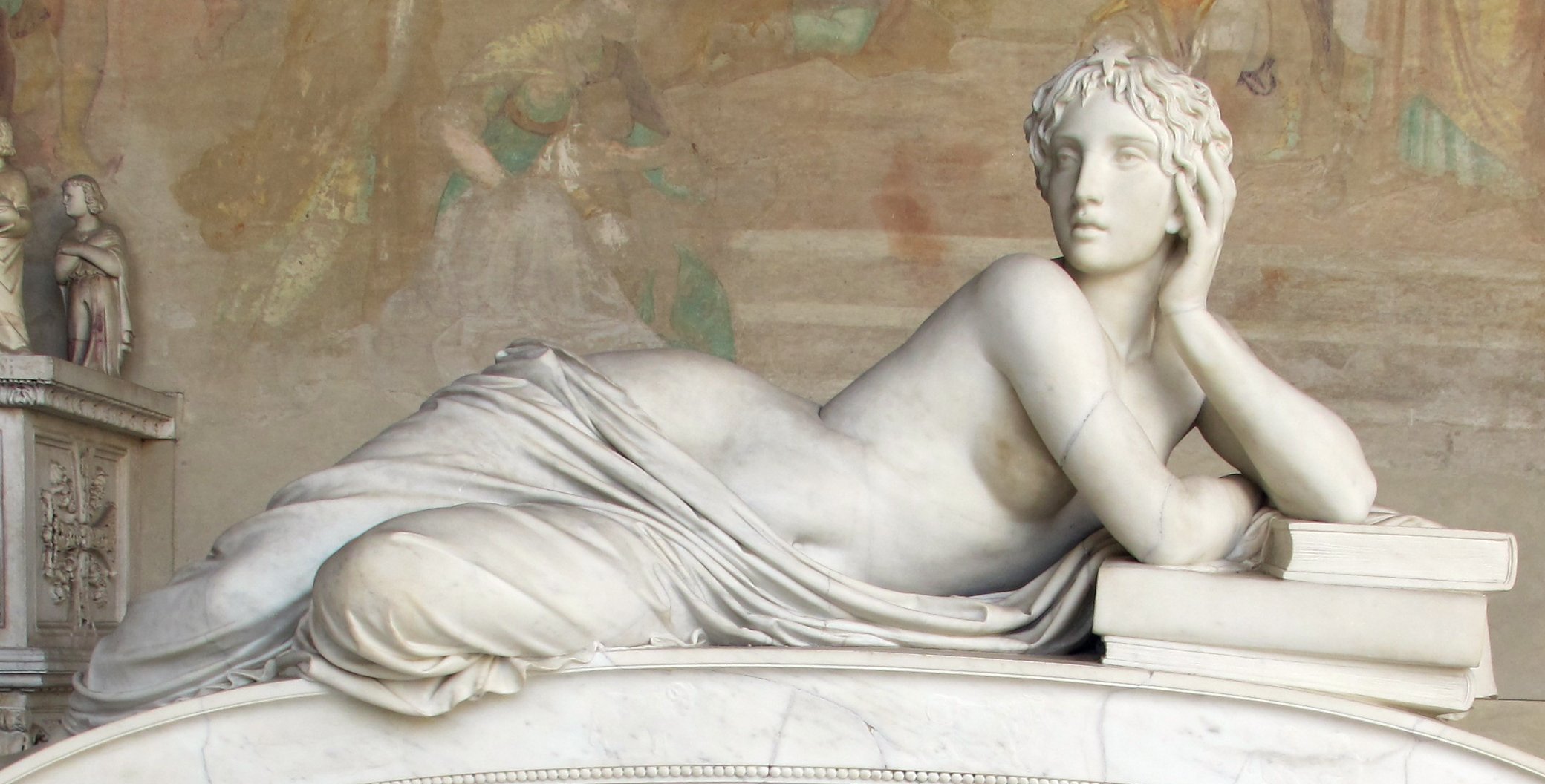Urania had at least one son, but his existence varies by myth. In one variant, she is the mother of Linus, an ancient Greek musician, and son of Apollo.
"Sons of Apollo . . . Linus by the Musa Urania."
- Pseudo-Hyginus, Fabulae 161 (trans. Grant) (Roman mythographer C2nd A.D.)
"Ourania (Urania) bare Linos, a very lovely son : and him all men who are singers and harpers do bewail at feats and dances, and as they begin and as they end they call on Linos (Linus)."
- Homerica, Fragments of Unkown Position 1 (from Diogenes Laertius 8. 1. 26) (trans. Evelyn-White) (Greek epic B.C.)
Another myth says she gave birth to Hymenaeus, the Greek god of marriage ceremonies:
"Hymenaios (Hymenaeus) [in a game of cottabus against Eros] . . . put up as a prize for the victor something clever made by his haughty mother Ourania (Urania), who knew all the courses of the stars, a revolving globe like the speckled form of Argos."
- Nonnus, Dionysiaca 33. 55 ff
Other ancient texts name Linus and Hymenaeus as the children of other muses rather than Urania, or sow uncertainty about the precise lineage of the muses:
"Oh Linos (Linus), honoured by the gods—-for you were the first to whom the immortals gave a song for men to sing with clear voice; Phoibos (Phoebus) [Apollon] killed you in anger, but the Mousai (Muses) mourn for you."
- Greek Lyric V, Folk Songs Frag 880 (from Scholiast B on Homer's Iliad) (trans. Campbell) (Greek lyric B.C.)
"Linos: Of Khalkis (Chalcis), [son] of Apollon and Terpsikhore (Terpsichore), but others [say] of Amphimaros (Amphimarus) and Ourania (Urania), others of Hermes and Ourania."
- Suidas s.v. Linos (trans. Suda On Line) (Byzantine Greek lexicon C10th A.D.)
"But in another song did three goddesses [Mousai (Muses)] lull to rest the bodies of their sons. The first of these [Terpsikhore (Terpsichore)] sang a dirge over the clear-voiced Linos (Linus) [personification of the lamentation song]; and the second [Ourania (Urania)] lamented with her latest strains Hymenaios (Hymenaeus) [personification of the wedding song], who was seized by Moira (Fate), when first he lay with another in wedlock."
- Pindar, Dirges Fragment 139 (trans. Sandys) (Greek lyric C5th B.C.)
Nonnus suggests that Hymenaeus shared a name with Urania’s son, but insists that they were not the same person:
"[During the war of Dionysos against the Indians, the Indian River Hydaspes tried to drown the god's army :] Ourania (Urania) saved Hymenaios (Hymenaeus) from destruction, because he had the same name as her own creative son, and scored the airy paths like a moving star, to please Dionysos, her brother of the grapes."
- Nonnus, Dionysiaca 24. 77 ff (trans. Rouse) (Greek epic C5th A.D.)
Urania
Urania, pine, sister, thus I name
you, since your finger-trunk points up above;
the wind that strains at your black mane grows calm
beneath. I summon you as, in their grove,
druids once did in crowns of mistletoe,
that at my house's threshold you endure,
watch over flower, fruit and bee below,
and hearts that secretly extinguish here.
Urania, Muse of the final day,
goddess of endings and endurance, bless!
Idol of ruins and all evils, stay
in vigil over house and nothingness.
O wild one, take me in your tangled mane,
tear off my hands, which will no longer twine;
enter me, save me and grant me your crown,
make me Urania, nothingness and pine.
- Jarosław Iwaszkiewicz (translated by Jakob Ziguras)
*
URA′NIA (Ourania).
One of the Twelve Muses in Greek mythology, a daughter of Zeus by Mnemosyne. (Hes. Theog. 78 ; Ov. Fast.v. 55.) The ancient bard Linus is called her son by Apollo (Hygin. Fab. 161), and Hymenaeus also is said to have been a son of Urania. (Catull. lxi. 2.)
She was regarded as the Muse of Astronomy, and represented with a celestial globe to which she points with a little staff. Also often pictured with the compass, since her organizaton of the stars helps sailors find their way in the dark.
"As you go along the straight road to the grove [of the Mousai (Muses) on Mount Helikon (Helicon) in Boiotia] is a portrait of Eupheme carved in relief on a stone. She was, they say, the nurse of the Mousai (Muses). So her portrait is here, and after it is Linos (Linus) on a small rock worked into the shape of a cave. To Linos every year they sacrifice as to a hero before they sacrifice to the Mousai. It is said that this Linos was a son of Ourania (Urania) and Amphimaros (Amphimarus), a son of Poseidon."
- Pausanias, Description of Greece 9. 29. 5 (trans. Jones) (Greek travelogue C2nd A.D.)
